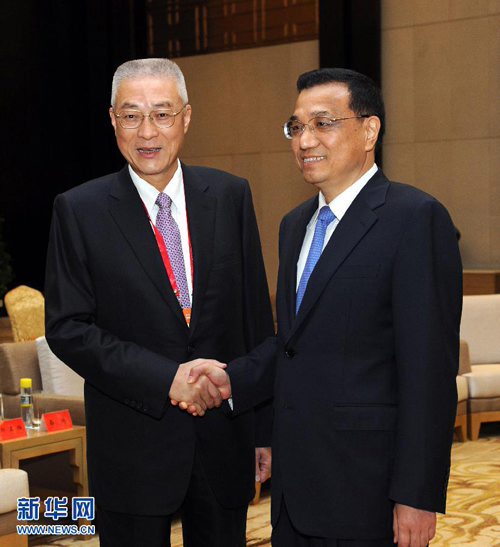Vice premier calls for boosting cross-Strait relations
 0 Comment(s)
0 Comment(s) Print
Print E-mail Xinhua, April 1, 2012
E-mail Xinhua, April 1, 2012
Vice Premier Li Keqiang on Sunday called for boosting cross-Strait relations, promoting economic cooperation between the mainland and Taiwan and letting the people of both sides share the fruits of development.
 |
| Li Keqiang (R) meets with a delegation from Taiwan at this year's Boao Forum for Asia (BFA) in China's southern island province of Hainan. The delegation is headed by Wu Den-yih (L), chief advisor of the Taiwan-based Cross-Strait Common Market Foundation. [Xinhua] |
Li made the statement while meeting with a delegation from Taiwan at this year's Boao Forum for Asia (BFA) in China's southern island province of Hainan. The delegation is headed by Wu Den-yih, chief advisor of the Taiwan-based Cross-Strait Common Market Foundation.
Li said the mainland will consolidate a common political foundation by opposing "Taiwan independence" and recognizing the "1992 consensus," and continue to implement policies that promote cross-Strait relations.
"People from both sides belong to the Chinese nation, and both economies belong to the Chinese economy," Li said, adding that cross-Strait economic cooperation should be deepened to promote common development and benefit the people of both sides.
Efforts should be made to accelerate follow-up negotiations for the cross-Strait Economic Cooperation Framework Agreement (ECFA), signed in June 2010, as well as promote other cross-Strait talks and agreements, Li said.
A cross-Strait monetary settlement mechanism, as well as a mechanism for jointly supervising the banking, security and insurance sectors, should be put into place, Li said.
Li said the mainland "encourages and supports" mainland enterprises to invest in Taiwan, adding that he hopes the island can provide the necessary environment and conditions for doing so.
The mainland will continue to support Taiwanese businesses operating on the mainland, helping them to expand their market, safeguard their rights and solve their problems, Li said.
"We will continue to listen to opinions from grassroots Taiwanese people, such as small- and medium-sized enterprise owners, farmers and fishermen," he said.
Li said he welcomes the approval of individual tourist visits for ten additional mainland cities this year, as this will be conducive to "enhancing cross-Strait understanding and promoting Taiwan's tourism development."
According to a deal reached between the two sides on Sunday, residents of the cities of Tianjin, Chongqing, Nanjing, Hangzhou, Guangzhou, Chengdu, Jinan, Xi'an, Fuzhou and Shenzhen will soon be able to visit Taiwan as individual tourists.
Wu said cross-Strait relations have been on the "proper path" of peace and stability over the past four years, and Taiwan has been free of turmoil.
Based on the "1992 consensus," Taiwan and the mainland have reached 16 deals and realized stable development against the backdrop of the international economic downturn, Wu said.
"Cross-Strait peace and stability should be cherished and consolidated by both sides," he said.
Wu said he hopes both sides will seek common ground, shelve disputes, uphold cross-Strait harmony and emphasize the livelihoods of their respective populations.






Go to Forum >>0 Comment(s)